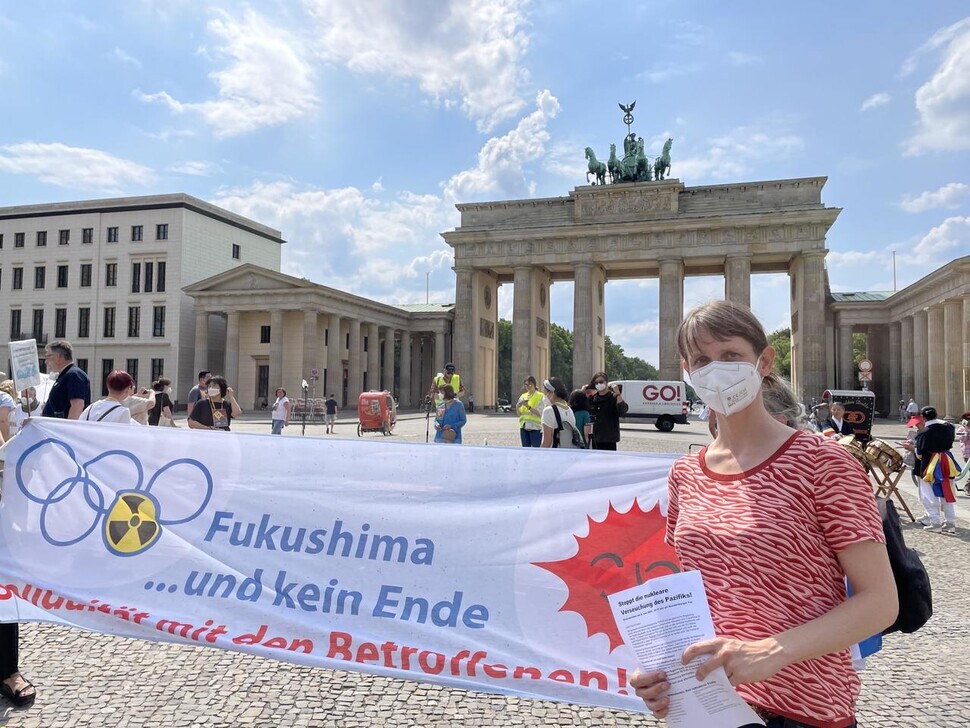hankyoreh
Links to other country sites 다른 나라 사이트 링크
70 US civic groups sign letter to condemn Fukushima water release

Seventy American civic groups have written a letter voicing their opposition to Japan’s plan to release radioactive water from the Fukushima Daiichi Nuclear Power Plant into the ocean.
A South Korean group called Joint Action to Prevent Japan’s Release of Radioactive Water (Joint Action, for short) announced Tuesday that the Manhattan Project for a Nuclear-Free World and other civic groups had sent the letter to Japan’s Ministry of Foreign Affairs and Ministry of Economy, Trade, and Industry via the Japanese consulate in New York and the Japanese delegation to the UN on June 5 to mark World Environment Day, as well as World Oceans Day, which falls on June 8.
In their letter, the civic groups made eight demands to the Japanese government. Their demands are as follows: to retract its decision to release the radioactive water at Fukushima into the ocean, to canvass opposition to releasing the water in Japan and the international community, to stop using the misleading phrase “treated water,” to devise alternatives such as building more storage tanks, to admit to the international community that the Advanced Liquid Processing System cannot remove radioactive materials, to acknowledge the danger of tritium, to transparently release all the information about the contaminated water and the plant where the accident occurred, and to hold regular hearings and guarantee the participation of experts and civic groups.
While Japan isn’t close to the US, American civic groups are condemning the Japanese government’s decision as South Korean environmental groups have done because the contaminated water could be brought by currents in the North Pacific Ocean to the west coast of Canada and the US.
The Korea Atomic Energy Research Institute (KAERI) concluded in 2013 that Cesium-137 released during the Fukushima nuclear accident would reach South Korean waters in four or five years, after following ocean currents north in a circle around the North Pacific Ocean.
KAERI also said that the radionuclides would be so widely diluted over that period of time that their concentration would not be detectable. But environmental groups have underlined that the safety issue hasn’t been completely resolved because the total amount of radioactive material doesn’t change.
Joint Action is a coalition that was formed on May 26, after the Japanese government decided to release contaminated water from Fukushima in April. The coalition represents a wide range of interests, including various regions, consumers’ cooperatives, religious groups, organized labor, the fishing industry, and civic society.
“This letter shows that groups not only in Asia but also in the US are showing solidarity with the opposition voiced by Korean environmental groups,” said Song Ju-hee, an energy and climate activist with the Korea Federation for Environmental Movements who is part of Joint Action.
The Manhattan Project for a Nuclear-Free World, which was established in Manhattan, New York, in March 2012, is a nonprofit organization engaged in various activities for the abolition of nuclear power and nuclear weapons. The group’s members are experts, lawyers, and others concerned about the dangers and humanitarian impact of nuclear technology.
By Choi Woo-ri, staff reporter
Please direct comments or questions to [english@hani.co.kr]

Editorial・opinion
![[Editorial] Penalties for airing allegations against Korea’s first lady endanger free press [Editorial] Penalties for airing allegations against Korea’s first lady endanger free press](https://flexible.img.hani.co.kr/flexible/normal/500/300/imgdb/original/2024/0502/1817146398095106.jpg) [Editorial] Penalties for airing allegations against Korea’s first lady endanger free press
[Editorial] Penalties for airing allegations against Korea’s first lady endanger free press![[Editorial] Yoon must halt procurement of SM-3 interceptor missiles [Editorial] Yoon must halt procurement of SM-3 interceptor missiles](https://flexible.img.hani.co.kr/flexible/normal/500/300/imgdb/child/2024/0501/17145495551605_1717145495195344.jpg) [Editorial] Yoon must halt procurement of SM-3 interceptor missiles
[Editorial] Yoon must halt procurement of SM-3 interceptor missiles- [Guest essay] Maybe Korea’s rapid population decline is an opportunity, not a crisis
- [Column] Can Yoon steer diplomacy with Russia, China back on track?
- [Column] Season 2 of special prosecutor probe may be coming to Korea soon
- [Column] Park Geun-hye déjà vu in Yoon Suk-yeol
- [Editorial] New weight of N. Korea’s nuclear threats makes dialogue all the more urgent
- [Guest essay] The real reason Korea’s new right wants to dub Rhee a founding father
- [Column] ‘Choson’: Is it time we start referring to N. Korea in its own terms?
- [Editorial] Japan’s rewriting of history with Korea has gone too far
Most viewed articles
- 1Months and months of overdue wages are pushing migrant workers in Korea into debt
- 2[Editorial] Penalties for airing allegations against Korea’s first lady endanger free press
- 3Bills for Itaewon crush inquiry, special counsel probe into Marine’s death pass National Assembly
- 4Trump asks why US would defend Korea, hints at hiking Seoul’s defense cost burden
- 560% of young Koreans see no need to have kids after marriage
- 6S. Korea discusses participation in defense development with AUKUS alliance
- 7[Reporter’s notebook] In Min’s world, she’s the artist — and NewJeans is her art
- 8Korean firms cut costs, work overtime amid global economic uncertainties
- 91 in 3 S. Korean security experts support nuclear armament, CSIS finds
- 10[Guest essay] Maybe Korea’s rapid population decline is an opportunity, not a crisis